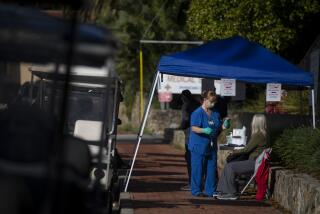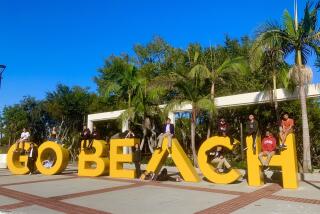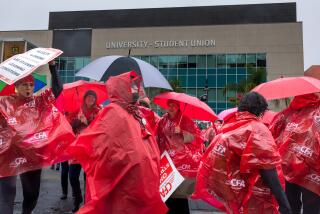CSU Channel Islands Launches Fund-Raising Drive
- Share via
Stepping into a new world of public-private partnerships, Cal State leaders Monday officially launched a groundbreaking campaign aimed at generating the cash needed to build Ventura County’s first public four-year university.
With the inaugural phase of the college set to open Aug. 30, officials swore in seven members of the authority that will serve as the landlord and financial manager for the campus under development at the shuttered Camarillo State Hospital complex.
The authority, a cross between a redevelopment agency and the type of entity used to revive mothballed military bases, will be responsible for raising revenues from property and sales taxes, selling bonds and providing tax incentives to lure private and public ventures to the 630-acre property.
“This is unique in higher education planning,” said Cal State Channel Islands President Handel Evans, a member of the new panel. “I think this exemplifies, underlines and really reinforces the terrific partnerships we have developed between the university and local city and county offices.”
Signed into law last fall by then-Gov. Pete Wilson, the California State University Channel Islands Site Authority Act established the makeup and mission of the seven-member panel.
In addition to Evans, the members are CSU Trustee Laurence K. Gould Jr.; former Trustee Jim Considine Jr.; CSU Vice Chancellor Richard P. West; Camarillo City Councilwoman Charlotte Craven; and Ventura County Supervisors Kathy Long and Frank Schillo.
A potential model for university development across the state and the nation, the site authority will be responsible for drawing a plan to reuse the hospital property and drumming up the money to pay for that effort.
The panel is not needed to launch the inaugural phase of the campus, as lawmakers already have earmarked $16.5 million to convert the former hospital into the new home of the Ventura campus of Cal State Northridge.
Rather, its role will be to generate the $25 million to $50 million necessary to expand the center into a free-standing university, the 23rd campus in the Cal State University system.
“This is quite a challenge that has been thrown down,” said Considine, an Ojai resident who was elected chairman of the new panel Monday. “But we have been given a lot of flexibility to be creative and entrepreneurial.”
It has taken a lot of work to get this far.
While there has generally been support locally and in Sacramento for creation of a Cal State campus in Ventura County, the financing plan hit some snags along the way.
In an April 1 hearing before a key Senate panel on the legislation authorizing the creation of the special authority, lawmakers tore into the plan, questioning the level of commercial development that would be needed to expand and support the campus.
Schillo bore the brunt of that criticism. He had gone to Sacramento to urge lawmakers to endorse the bill, written by state Sen. Jack O’Connell (D-San Luis Obispo). But he found himself blindsided by a wave of Senate scrutiny, fending off questions about a financing scheme never before proposed for higher education funding.
One lawmaker in particular was incredulous about the county’s willingness to forfeit until fiscal year 2030-31 its share of local tax dollars that will be generated at the site. The authority will receive the local share of tax revenues flowing from the site.
“I think they misjudged the significance to Ventura County of getting this university started,” Schillo said Monday. “They didn’t understand there is something more important than the money. It’s more important for our young people, and those people searching for education, to have an opportunity they wouldn’t otherwise have to attend a college close by.”
As landlords go, the authority is more eager than most to sign long-term tenants.
Even as the CSU governing board signed off last September on transforming the hospital complex into a four-year university, trustees made it clear that the only way the local campus would grow is if it found ways to generate the cash to make it happen.
Toward that end, planners are creating a commercial hub and establishing a range of other moneymaking ventures to help the college pay its way.
That is where the authority will play its most vital role, serving as an economic engine to fuel development and pump out a steady stream of cash to support university projects.
Already, the university is leasing space to nine commercial tenants. CSU officials believe the special authority will be able to build on that early success.
“This is a watershed moment,” Evans said. “This is the culmination of a lot of work by a lot of people, and it puts us well on our way to achieving our goals.”
More to Read
Sign up for Essential California
The most important California stories and recommendations in your inbox every morning.
You may occasionally receive promotional content from the Los Angeles Times.













